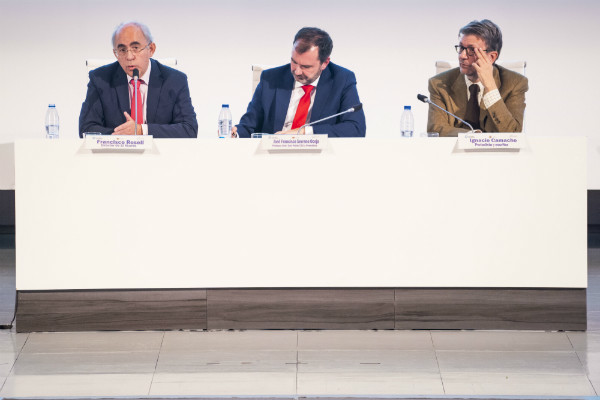The results of the 10-N elections were this Thursday the reason for the meeting of the eighth session of the lecture series 'The alternative to the Popular Front' : a cultural debate, which was held in the Mutua Madrileña auditorium and was organized by the Values and Society foundations , Villacisneros and the San Pablo CEU University .
The presentation of the act was in charge of the vice president of the Villacisneros Foundation, María San Gil , who gave way to the subsequent debate under the title Spain after the elections. The round table, moderated by the professor of the San Pablo CEU University and journalist Francisco Serrano Ocejo , featured Francisco Rosell , director of EL MUNDO, and Abc columnist Ignacio Camacho .
In her speech to inaugurate the session, the former president of the popular Basques stressed that it was "essential to help form an alternative to the Popular Front , " referring to the 12-N pact between the Socialist Party and United We Can. "We would have liked a socialist and constitutionalist government," he said, referring to the political formula of the hypothetical pact between PSOE and PP.
Francisco Rosell stressed that "we have defended the great coalition, PP, PSOE and Citizens, but it will not exist. What we live, the destruction of the constitutional system, is a consequence of the Tinell Pact . The PSOE ceases to be a defender of the Constitution" .
The Catalan conflict was also the protagonist of the debate. "The Spanish constitution in recent years has been emptied," said Rosell, who pointed out precisely that the Catalan parties have ceased to be "nationalists to be independentists." In addition, the director of EL MUNDO said that independence has spread throughout the country. "We live a very complicated moment, the process has passed from Catalonia to all of Spain . The rupture means that the State has disappeared. What happens in Catalonia is that independence is proven right and everything is condemned to silence others, "he said.
He also highlighted the role of the media, expressing that "they are in the hands of power instruments dominating the television space and hiding reality from society."
In the same initial line that María San Gil intervened Ignacio Camacho, who described the election results as a response to "fatigue and tiredness" caused by the long process that is still going on. "A third of Congress today doubts the four pillars of the system: sovereignty, the Monarchy, individual rights and statutes of autonomy, " he said. And he reflected on the support for the investiture that Pedro Sánchez still requires, despite the agreement signed with United We can for a coalition government. "Can a president like Sanchez who fails three times aspire to a consensus with a party?" The journalist concluded.
Like the vice president of the Villacisneros Foundation , Camacho referred to the almost unfeasible alternative of a pact between the PSOE and the Popular Party. "We are not facing a constituent project but a deconstituent one," he said.
The event was also attended by the former Interior Minister, former MEP with the Popular Party and current president of the Values and Society Foundation, Jaime Mayor Oreja , who completed the session of a cycle of conferences that will resume its activity in 2020, next January 13.
According to the criteria of The Trust Project
Know more- PSOE
- Catalonia
- Spain
- PP
- United We Can
- Pedro Sanchez
- Citizens
- Politics
General Elections 10 NBaleares returns to the polls to try to end the blockade
Spain Albert Rivera charges against the PSC: "It is a nationalist party" and "the main obstacle to a transversal agreement" with PP and Cs
internal debate Feijóo warns Pablo Casado: "We cannot be happy, we are missing five million votes"

